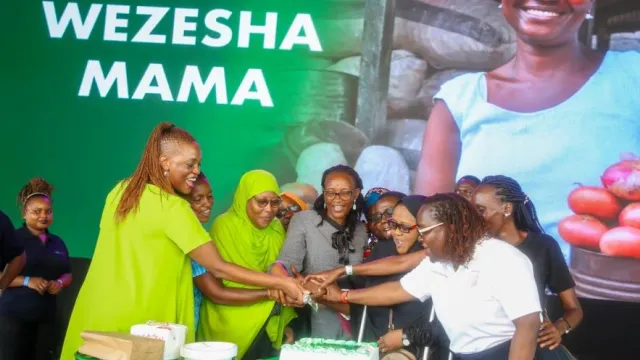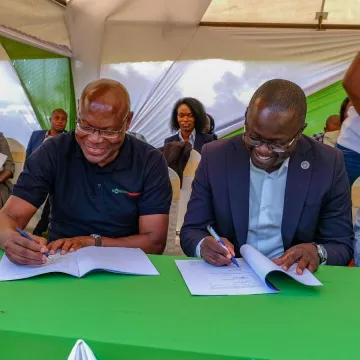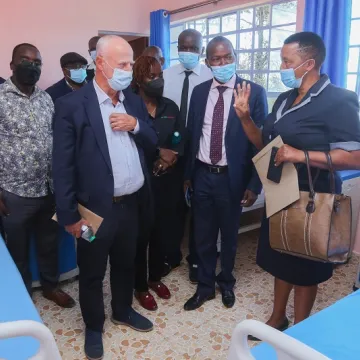Wezesha Mama: the power of a hand up in women chamas

Chief Financial Services Officer, Esther Waititu (left) and Safaricom's Sustainable Business and Social Impact, Karen Basiye (right) officially launch the Wezesha Mama Programme.
Across villages, towns and cities in Kenya, countless groups of women meet virtually every week, not for idle banter, but to knit a shared future. But while the spirit remains strong, quite often, their resilience, industry, and will-power, is stretched to the limit due to limited finances.
Statistics show that mainstream banks often recoil at chamas lack of adequate collateral. Additionally, for those who manage to get past the lenders' scrutiny, loans come at a steep price. And at this point, these chamas' dreams, like candles in the wind, flicker quietly--barely seen, rarely heard, if ever.
However, a quiet revolution is underway, seeking to turn the dreams of chamas a reality, a group at a time. The M-PESA Foundation has launched Wezesha Mama, a fresh initiative that seeks to offer a hand up to women's enterprises, further fueling their plans and ambitions. Additionally, this initiative aims at bridging the gap that has kept women across Kenya at the edges of mainstream financing.
Launched during M-PESA Sokoni Festival at Mombasa Sports Club, the 12-month programme seeks to offer registered women groups financial and digital literacy, business planning, marketing and branding support, and perhaps most critically, access to grants for the top-performing women’s groups across Kenya.
The Foundation has set its sights on empowering over 500 registered women’s groups, equipping them with not just knowledge, but also the confidence to demand a seat at Kenya’s economic table.
“Wezesha Mama is not just a programme, it is a movement,” said Nicholas Nganga, Chairman of the M-PESA Foundation, at the event’s unveiling. “When women rise, entire communities rise.”
In a society where women make up the backbone of the informal economy—running roadside stalls, managing poultry ventures, weaving crafts, and selling produce—their potential is boundless.
Yet, for decades, mainstream financial systems have labelled them too risky. Their enterprises, though vital to household and community welfare, are often dismissed as “small” or “unscalable.” The result? Women entrepreneurs remain shackled by limited capital, exclusion from growth opportunities, and a system that prefers forms over function.
But Wezesha Mama seeks to rewrite this script. At its heart, the initiative recognizes what economists, development workers, and families across Kenya have always known: when a woman is economically empowered, her impact ripples outward—feeding children, educating daughters, building homes, and uplifting entire communities.
Wezesha Mama is structured to criss-cross all the 47 counties, tailoring its curriculum and support to regional contexts. The idea is not to plant cookie-cutter solutions but to water the seeds already sprouting in local soil. Women’s groups will be trained to improve their products, access new markets, digitize operations, and develop branding that tells their unique stories with pride.
To add a touch of healthy competition and reward impact, the top three groups from each of the five programme regions will walk away with grants of KES500,000, KES300,000, and KES200,000 respectively. According to the Foundation, this is catalytic capital that is meant to accellerate turning their dreams into realities.
Furthermore, every participating group will become part of the growing M-PESA Mama Network—a nationwide sisterhood of women entrepreneurs connected through shared learning, peer mentorship, and collaborative growth.
This networking is tailored to eliminate the isolation so many women in business face, and instead establish a virtual table where everyone brings something.
Wezesha Mama is organised to help builds on M-PESA Foundation’s longstanding partnerships with grassroots enablers such as Hand in Hand East Africa and Rose Women Foundation—organizations that have already proven the transformative power of small-scale financing and business training tailored for women.
In the months ahead, from Kisumu to Kitui, from Bungoma to Bomet, the Wezesha Mama caravan will roll on. Not with blaring sirens, but with the sound of women reclaiming their agency, one business pitch at a time.





